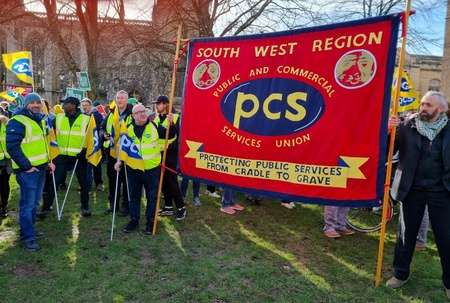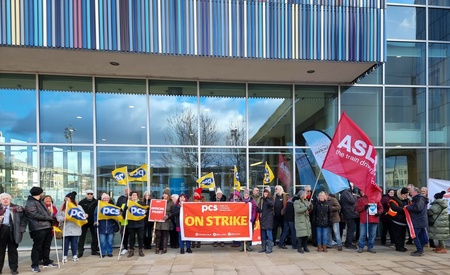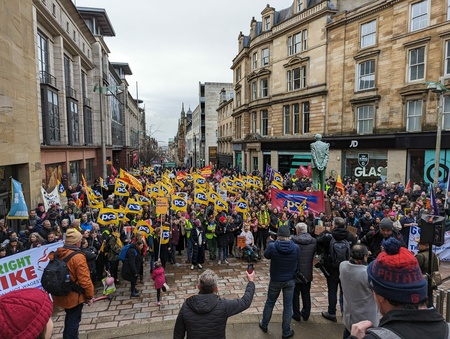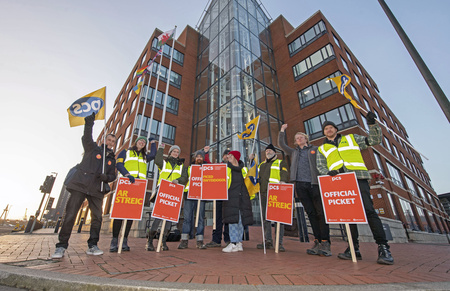Campaigns
-
PCS pay, pensions and jobs campaign
- Our cost of living calculator
- Ballot results May 2024
- Employers included in the PCS statutory ballot 8 March - 13 May 2024
- Strike Ballot FAQs
- Pay FAQs
- Scottish Sector - Devolved Areas and the National Campaign
- Donate to the PCS Strike Fund to support members taking action
- Cost of living survey shows members’ struggles
- Timeline of strike action
- Defending Trade Union Rights
- General Election 2024
- Fighting racism and fascism
- Pensions
- Redundancy rights
- International
- Green workplaces
- PCS in parliament
Timeline of strike action and events in PCS national campaign
Our strategy of targeted strikes has enabled us to call more successful industrial action than at any other time in our union’s history, with targeted strike action involving thousands of members. we have also had three national strike days involving tens of thousands of members. Our strike action has been brilliantly supported and workers have flocked to join the union.
Follow the timeline to see how we got here and who has been involved since our first national ballot in November 2022.
Our successful campaign of industrial action won an increased pay remit, £1500 cost-of-living payment and guarantees on redundancy terms. It also forced the Cabinet Office into a series of talks with PCS on pay and staffing.
Members are being balloted for strike action in a dispute over an attempt by management to erode their terms and conditions.
Over 250 PCS members working for The Pensions Regulator (TPR) are on strike between 5 and 18 September because their employer is refusing to pay the government's revised pay remit.
90% of members who voted agreed with the plan on how to continue the campaign.
Members have massively endorsed the union’s industrial strategy by 90.3% to 9.7% on a 47% turnout. This will send a strong message to the government and employers that while the concessions we have won are significant, they are not enough and our campaign continues.
PCS members in two areas have already successfully called targeted strike action to force their employers to pay the £1,500 lump sum recommended in the UK Government’s pay concessions.
He announced significant concessions by the government relating to pay, redundancy terms and job security.
The key elements of the government’s proposal are:
- A non-consolidated lump sum of £1,500 in recognition of cost-of-living pressures in 2022/23. The payment will be made by individual employers over the next few weeks following meetings with the union.
- An increase in the headline pay remit figure from 2% to 4.5%, with an extra 0.5% for the lowest paid, for 2023/24.
- A commitment to further talks on low pay and greater coherence of pay within the civil service.
- The government will not take any action or make any changes to the Civil Service Compensation Scheme until 2025, which in effect will be after the next general election.
- A commitment to further talks on strengthening redundancy avoidance measures through the jobs protocols, taking account of the changed world of work following the Covid-19 pandemic and the acceleration of use of new technology in that changed world.
HMRC members working in Personal Taxation Operations on Employer Services in East Kilbride and Benton Park View in Newcastle start 20 days of strike action.
One in five workers at the Department for Work and Pensions claim in-work benefits, a shock PCS poll uncovered
Picket lines held at HM Passport Office sites in every country of the UK at the start of their 5-week strike, as well as at the British Library, Government Digital Services in London and the Animal and Plant Health Agency in Carlisle.
The latest round of targeted action involves members in the Passport Office, National Highways, British Library, British Museum, the Animal and Plant Health Agency, DVSA and Government Digital Service. They will be joined by 700 DVLA call centre workers on April 11 and 12.
More than 130,000 PCS members across the civil service and public sector will strike on 28 April in our latest one-day action alongside a month of walkouts to increase the pressure on the government on pay, pensions and job security.
PCS General Secretary Mark Serwotka warns ministers that even more strikes will follow unless they engage with the union and put money on the table
Fresh PCS strike ballots opened of 124,125 members in 186 employers across the civil service and public sector so members can continue to fight for fair pay, pensions justice and job security as part of our national campaign.
Our current 6-month legal mandate for strike action in 124 groups expires on 6 May, so to continue our industrial action campaign our national executive committee has agreed we need to ballot members again. The new postal ballots ran from 20 March until 9 May 2023.
All 4 of the areas balloted in the latest PCS industrial action ballots returned yes votes for action as part of our national campaign on pay, pensions, changes to the Civil Service Compensation Scheme and jobs.
Across the UK, PCS members were out on strike in their tens of thousands in our biggest strike for years to send a powerful message to the government that they have had enough of being poorly treated on pay, pensions and job security.
MPs were frustrated by the government’s lack of movement regarding our ongoing dispute and demanded ministers negotiate urgently.
100% of areas balloted, including HMRC, returned huge yes votes and crossed the 50% turnout threshold for action as part of our national campaign on pay, pensions, changes to the Civil Service Compensation Scheme and jobs following a number of re-ballots.
PCS members in 9 more employers were now able to take strike action and members in 4 groups also voted to take action short of strike.
PCS Ofsted members in Birmingham, Bristol, Manchester and Nottingham took action from March 6 to 29.
A meeting between PCS and Cabinet Office officials took place on 15 February to discuss our national dispute on pay, pensions, job security and redundancy terms.
We made it clear that we were in dispute over the four issues and that all of them would need to be addressed with PCS.
Ministers had previously said that they would not negotiate on our demands on 2022 pay. We made it clear that their position was not going to hold. Unless a resolution was found to address the cost-of-living crisis and the scandalously below inflation pay award for 2022, there would be no resolution to the dispute.
There was solid support for the start of a 4-day strike by Border Force officers in Dover, Calais, Coquelles and Dunkirk.
The British Museum is heavily disrupted by a week-long PCS strike as part of our targeted strike action.
DWP members in Stockport, Bolton and Liverpool walk out.
PCS members working for DVLA on Output Services Group (OSG) started 5 days of strike action.
PCS General Secretary Mark Serwotka writes to prime minister Rishi Sunak seeking a meeting to resolve the union’s long-running dispute over pay, pensions, redundancy terms and job security.
PCS announces an escalation of our targeted strike action programme and a one-day strike of 100,000 members in the civil service and public sector on Budget Day, 15 March.
PCS to run ballots from 9 February in Northern Ireland of members in the Home Office, Maritime and Coastguard Agency, Information Commissioner’s Office and Heritage Lottery Fund, to ask them to join our civil service strike action.
Tens of thousands of PCS members joined strike action, with hundreds of picket lines across the country as the largest civil service strike for over a decade caused disruption to services.
The PCS national executive committee agrees to call a one-day strike on 1 February of all members in employers where the turnout passed the 50% threshold required by law for action in our ballot last year.
Our rolling programme of targeted strike action goes on as the government plans legislation to prevent future strikes.
Our national campaign of strike action continues as members working for the DVLA in Swansea and Birmingham begin a five-day strike on 9 January.
3 to 6 January, 9 to 13 January: Rural Payments Agency - call-centre workers in Workington, Newcastle and Caernarfon, all other workers in Workington and Newcastle.
3 to 7 January: DWP - Doncaster Crossgate House (back of house and front-facing staff), Toxteth Jobcentre, Liverpool Duke Street Jobcentre, Liverpool City Jobcentre.
4 to 10 January: DVSA - London, South East, South Wales, South West, Aberystwyth, Basingstoke, Cardigan and Yeovil.
6 and 7 January: National Highways - traffic officer service employees, road traffic officers and control room operators: East Midlands and Eastern.
23 to 26 December, 28 to 31 December 2022: Border Force action at Port of Newhaven; Passport control at London Heathrow, London Gatwick, Manchester, Birmingham, Cardiff and Glasgow airports, causes considerable disruption.
DWP - Doncaster Crossgate House (back of house), Toxteth Jobcentre, Liverpool Duke Street Jobcentre, Liverpool City Jobcentre.
13 to 16 December, 19 to 23 December: Rural Payments Agency call-centre workers in Workington, Newcastle and Caernarfon.
13 to 18 December: DVSA - Scotland and Northern.
16 to 17 December: National Highways - traffic officer service employees, road traffic officers and control room operators - North West, Yorkshire and Humber and North East.
The legal turnout threshold of 50% was achieved in 124 areas allowing for major industrial action across the civil service and public sector.



